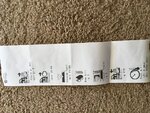Damian
Moderator
- Mar 14, 2005
- 7,510
- 937
- 30,935
I am having my car air con re-gassed on Thursday as it has not been as good as I think it should be in the heat we have had.
I would have used the Groupon thing but ATS shut down here a few months ago, but the local guy only charges £48 so not a great loss, and he is only about 1/4 mile from me.
I would have used the Groupon thing but ATS shut down here a few months ago, but the local guy only charges £48 so not a great loss, and he is only about 1/4 mile from me.


